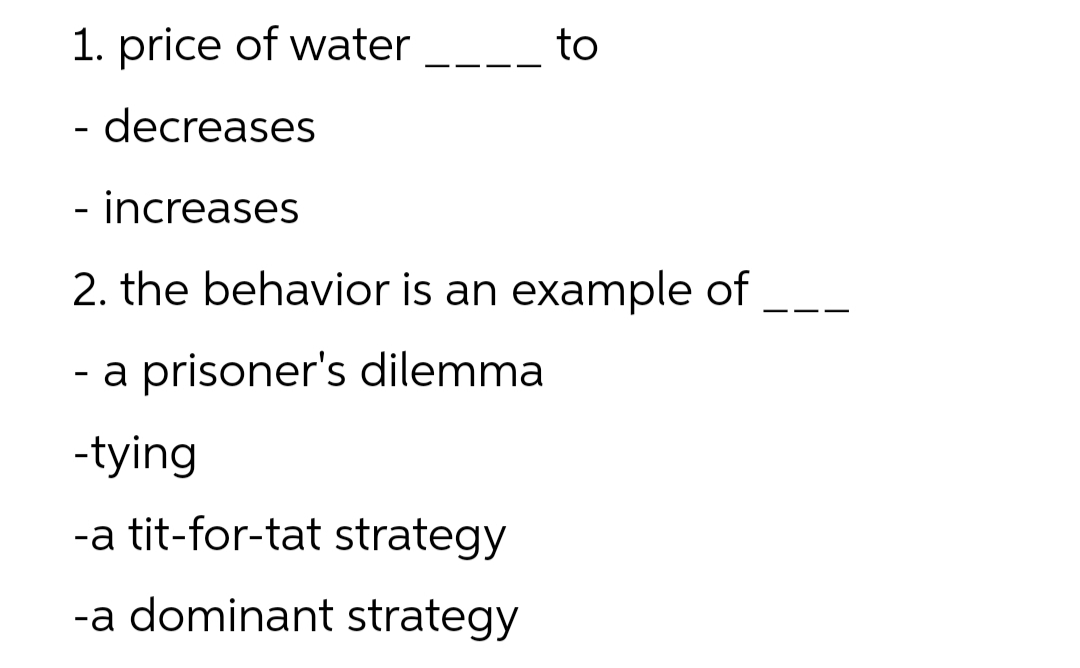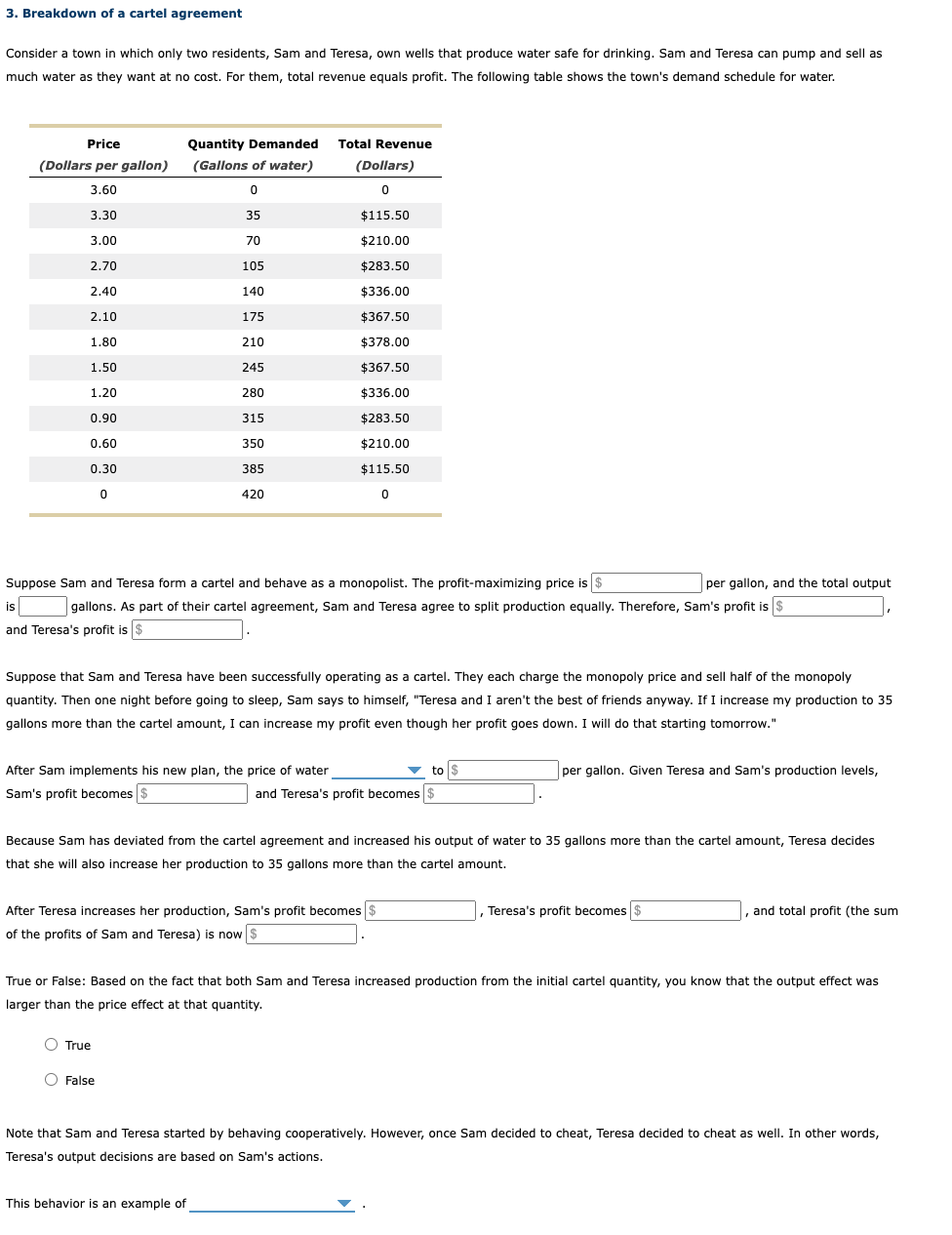2.70 105 $283.50 2.40 140 $336.00 2.10 175 $367.50 1.80 210 $378.00 1.50 245 $367.50 1.20 280 $336.00 0.90 315 $283.50 0.60 350 $210.00 0.30 385 $115.50 420 Suppose Sam and Teresa form a cartel and behave as a monopolist. The profit-maximizing price is $ per gallon, and the total output gallons. As part of their cartel agreement, Sam and Teresa agree to split production equally. Therefore, Sam's profit is $ and Teresa's profit is $ Suppose that Sam and Teresa have been successfully operating as a cartel. They each charge the monopoly price and sell half of the monopoly quantity. Then one night before going to sleep, Sam says to himself, "Teresa and I aren't the best of friends anyway. If I increase my production to 35 gallons more than the cartel amount, I can increase my profit even though her profit goes down. I will do that starting tomorrow." After Sam implements his new plan, the price of water to $ per gallon. Given Teresa and Sam's production levels, Sam's profit becomes $ and Teresa's profit becomes $ Because Sam has deviated from the cartel agreement and increased his output of water to 35 gallons more than the cartel amount, Teresa decides hat she will also increase her production to 35 gallons more than the cartel amount. After Teresa increases her production, Sam's profit becomes $ |, Teresa's profit becomes $ and total profit (the sum of the profits of Sam and Teresa) is now $ True or False: Based on the fact that both Sam and Teresa increased production from the initial cartel quantity, you know that the output effect was arger than the price effect at that quantity. O True O False O O
2.70 105 $283.50 2.40 140 $336.00 2.10 175 $367.50 1.80 210 $378.00 1.50 245 $367.50 1.20 280 $336.00 0.90 315 $283.50 0.60 350 $210.00 0.30 385 $115.50 420 Suppose Sam and Teresa form a cartel and behave as a monopolist. The profit-maximizing price is $ per gallon, and the total output gallons. As part of their cartel agreement, Sam and Teresa agree to split production equally. Therefore, Sam's profit is $ and Teresa's profit is $ Suppose that Sam and Teresa have been successfully operating as a cartel. They each charge the monopoly price and sell half of the monopoly quantity. Then one night before going to sleep, Sam says to himself, "Teresa and I aren't the best of friends anyway. If I increase my production to 35 gallons more than the cartel amount, I can increase my profit even though her profit goes down. I will do that starting tomorrow." After Sam implements his new plan, the price of water to $ per gallon. Given Teresa and Sam's production levels, Sam's profit becomes $ and Teresa's profit becomes $ Because Sam has deviated from the cartel agreement and increased his output of water to 35 gallons more than the cartel amount, Teresa decides hat she will also increase her production to 35 gallons more than the cartel amount. After Teresa increases her production, Sam's profit becomes $ |, Teresa's profit becomes $ and total profit (the sum of the profits of Sam and Teresa) is now $ True or False: Based on the fact that both Sam and Teresa increased production from the initial cartel quantity, you know that the output effect was arger than the price effect at that quantity. O True O False O O
Principles of Economics 2e
2nd Edition
ISBN:9781947172364
Author:Steven A. Greenlaw; David Shapiro
Publisher:Steven A. Greenlaw; David Shapiro
Chapter10: Monopolistic Competition And Oligopoly
Section: Chapter Questions
Problem 4SCQ: Sometimes oligopolies in the same industry are very different in size. Suppose we have a duopoly...
Related questions
Question
Hand written asap plzzzzzzzzz

Transcribed Image Text:1. price of water
to
- decreases
- increases
2. the behavior is an example of
- a prisoner's dilemma
-tying
-a tit-for-tat strategy
-a dominant strategy

Transcribed Image Text:3. Breakdown of a cartel agreement
Consider a town in which only two residents, Sam and Teresa, own wells that produce water safe for drinking. Sam and Teresa can pump and sell as
much water as they want at no cost. For them, total revenue equals profit. The following table shows the town's demand schedule for water.
Price
Quantity Demanded
Total Revenue
(Dollars per gallon)
(Gallons of water)
(Dollars)
3.60
3.30
35
$115.50
3.00
70
$210.00
2.70
105
$283.50
2.40
140
$336.00
2.10
175
$367.50
1.80
210
$378.00
1.50
245
$367.50
1.20
280
$336.00
0.90
315
$283.50
0.60
350
$210.00
0.30
385
$115.50
420
Suppose Sam and Teresa form a cartel and behave as a monopolist. The profit-maximizing price is $
per gallon, and the total output
is
gallons. As part of their cartel agreement, Sam and Teresa agree to split production equally. Therefore, Sam's profit is $
and Teresa's profit is $
Suppose that Sam and Teresa have been successfully operating as a cartel. They each charge the monopoly price and sell half of the monopoly
quantity. Then one night before going to sleep, Sam says to himself, "Teresa and I aren't the best of friends anyway. If I increase my production to 35
gallons more than the cartel amount, I can increase my profit even though her profit goes down. I will do that starting tomorrow."
per gallon. Given Teresa and Sam's production levels,
After Sam implements his new plan, the price of water
Sam's profit becomes $
▼ to $
and Teresa's profit becomes $
Because Sam has deviated from the cartel agreement and increased his output of water to 35 gallons more than the cartel amount, Teresa decides
that she will also increase her production to 35 gallons more than the cartel amount.
After Teresa increases her production, Sam's profit becomes $
of the profits of Sam and Teresa) is now $
Teresa's profit becomes $
|, and total profit (the sum
True or False: Based on the fact that both Sam and Teresa increased production from the initial cartel quantity, you know that the output effect was
larger than the price effect at that quantity.
O True
O False
Note that Sam and Teresa started by behaving cooperatively. However, once Sam decided to cheat, Teresa decided to cheat as well. In other words,
Teresa's output decisions are based on Sam's actions.
This behavior is an example of
Expert Solution
This question has been solved!
Explore an expertly crafted, step-by-step solution for a thorough understanding of key concepts.
This is a popular solution!
Trending now
This is a popular solution!
Step by step
Solved in 3 steps

Knowledge Booster
Learn more about
Need a deep-dive on the concept behind this application? Look no further. Learn more about this topic, economics and related others by exploring similar questions and additional content below.Recommended textbooks for you

Principles of Economics 2e
Economics
ISBN:
9781947172364
Author:
Steven A. Greenlaw; David Shapiro
Publisher:
OpenStax

Principles of Microeconomics
Economics
ISBN:
9781305156050
Author:
N. Gregory Mankiw
Publisher:
Cengage Learning

Principles of Microeconomics (MindTap Course List)
Economics
ISBN:
9781305971493
Author:
N. Gregory Mankiw
Publisher:
Cengage Learning

Principles of Economics 2e
Economics
ISBN:
9781947172364
Author:
Steven A. Greenlaw; David Shapiro
Publisher:
OpenStax

Principles of Microeconomics
Economics
ISBN:
9781305156050
Author:
N. Gregory Mankiw
Publisher:
Cengage Learning

Principles of Microeconomics (MindTap Course List)
Economics
ISBN:
9781305971493
Author:
N. Gregory Mankiw
Publisher:
Cengage Learning

Principles of Economics (MindTap Course List)
Economics
ISBN:
9781305585126
Author:
N. Gregory Mankiw
Publisher:
Cengage Learning

Principles of Economics, 7th Edition (MindTap Cou…
Economics
ISBN:
9781285165875
Author:
N. Gregory Mankiw
Publisher:
Cengage Learning